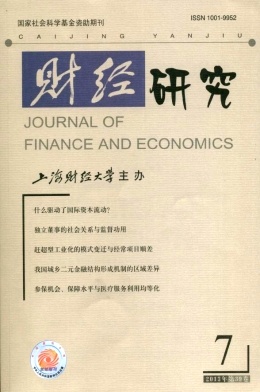独立董事的社会关系与监督功能——基于CEO被迫离职的证据
财经研究 2013 年 第 39 卷第 07 期, 页码:17 - 27
摘要
参考文献
摘要
独立董事是否"懂事"一直是颇有争议的话题。文章根据独立董事与CEO之间是否存在社会关系,区分了名义独立董事与实际独立董事,并基于CEO被迫离职,考察了独立董事的监督功能。研究发现,名义独立董事占比与CEO更替-绩效敏感性无关,实际独立董事占比提高则增强了CEO更替-绩效敏感性,而且CEO离职后公司绩效显著上升。这表明实际独立董事能够有效监督CEO,而与CEO存在社会关系的灰色董事却成了CEO的"保护伞"。文章还发现,独立董事的社会关系也有一定的存在价值。
[1]龚玉池.公司绩效与高层更换[J].经济研究,2001,(10):75-82.
[2]刘诚,杨继东,周斯洁.社会关系、独立董事任命与董事会独立性[J].世界经济,2012,(12):83-101.
[3]唐跃军,左晶晶.政策性扰动、大股东制衡与董事会独立性[J].财经研究,2010,(5):27-39.
[4]叶康涛,祝继高,陆正飞,等.独立董事的独立性:基于董事会投票的证据[J].经济研究,2011,(1):126-139.
[5]仲伟周,段海艳.基于董事个体态度和行为的董事会效率研究[J].管理世界,2008,(4):177-178.
[6]Adams R B,Ferreira D.A theory of friendly boards[J].Journal of Finance,2007,62(6):217-250.
[7]Adams R B,Hermalin B E,Weisbach M S.The role of boards of directors in corporategovernance:A conceptual framework and survey[J].Journal of Economic Literature,2010,48(1):58-107.
[8]Chang E C,Wong S M L.Governance with multiple objectives:Evidence from top ex-ecutive turnover in China[J].Journal of Corporate Finance,2009,15(2):230-244.
[9]Coles J L,Daniel N D,Naveen L.Co-opted boards[R].Working Paper,2010.
[10]Drakos A A,Bekiris F V.Endogeneity and the relationship between board structureand firm performance:A simultaneous equation analysis for the Athens Stock Exchange[J].Managerial and Decision Economics,2010,31(6):387-401.
[11]Fama E,Jensen M.Separation of ownership and control[J].Journal of Law and Eco-nomics,1983,26(2):301-325.
[12]Fracassi C,Tate G A.External networking and internal firm governance[J].Journal ofFinance,2012,67(1):153-194.
[13]Granovetter M.Economic action and social structure:The problem of embeddedness[J].American Journal of Sociology,1985,91(3):481-510.
[14]Hermalin B E,Weisbach M S.Boards of directors as an endogenously determined in-stitution:A survey of the economic literature[J].Federal Reserve Bank of New YorkEconomic Policy Review,2003,4(1):7-26.
[15]Hoitash U.Should independent board members with social ties to management dis-qualify themselves from serving on the board?[J].Journal of Business Ethics,2011,99(3):399-423.
[16]Huson M,Parrino R,Starks L.Internal monitoring mechanisms and CEO turnover:Along-term perspective[J].Journal of Finance,2001,56(6):2265-2297...
[17]Hwang B-H,Kim S.It pays to have friends[J].Journal of Financial Economics,2009,93(1):138-158.
[18]Jensen M C,Meckling W H.Theory of the firm:Managerial behavior,agency costsand ownership structure[J].Journal of Financial Economics,1976,3(4):305-360.
[19]Kato T,Long C.CEO turnover,firm performance,and enterprise reform in China:Ev-idence from micro data[J].Journal of Comparative Economics,2006,34(4):796-817.
[20]Taylor L A.Why are CEOs rarely fired?Evidence from structural estimation[J].Jour-nal of Finance,2010,65(6):2051-2087.
[21]Volpin P F.Governance with poor investor protection:Evidence from top executiveturnover in Italy[J].Journal of Financial Economics,2002,64(1):61-90.
[22]Weisbach M S.Outside directors and CEO turnover[J].Journal of Financial Economi-cs,1988,20(1-3):431-460.
[2]刘诚,杨继东,周斯洁.社会关系、独立董事任命与董事会独立性[J].世界经济,2012,(12):83-101.
[3]唐跃军,左晶晶.政策性扰动、大股东制衡与董事会独立性[J].财经研究,2010,(5):27-39.
[4]叶康涛,祝继高,陆正飞,等.独立董事的独立性:基于董事会投票的证据[J].经济研究,2011,(1):126-139.
[5]仲伟周,段海艳.基于董事个体态度和行为的董事会效率研究[J].管理世界,2008,(4):177-178.
[6]Adams R B,Ferreira D.A theory of friendly boards[J].Journal of Finance,2007,62(6):217-250.
[7]Adams R B,Hermalin B E,Weisbach M S.The role of boards of directors in corporategovernance:A conceptual framework and survey[J].Journal of Economic Literature,2010,48(1):58-107.
[8]Chang E C,Wong S M L.Governance with multiple objectives:Evidence from top ex-ecutive turnover in China[J].Journal of Corporate Finance,2009,15(2):230-244.
[9]Coles J L,Daniel N D,Naveen L.Co-opted boards[R].Working Paper,2010.
[10]Drakos A A,Bekiris F V.Endogeneity and the relationship between board structureand firm performance:A simultaneous equation analysis for the Athens Stock Exchange[J].Managerial and Decision Economics,2010,31(6):387-401.
[11]Fama E,Jensen M.Separation of ownership and control[J].Journal of Law and Eco-nomics,1983,26(2):301-325.
[12]Fracassi C,Tate G A.External networking and internal firm governance[J].Journal ofFinance,2012,67(1):153-194.
[13]Granovetter M.Economic action and social structure:The problem of embeddedness[J].American Journal of Sociology,1985,91(3):481-510.
[14]Hermalin B E,Weisbach M S.Boards of directors as an endogenously determined in-stitution:A survey of the economic literature[J].Federal Reserve Bank of New YorkEconomic Policy Review,2003,4(1):7-26.
[15]Hoitash U.Should independent board members with social ties to management dis-qualify themselves from serving on the board?[J].Journal of Business Ethics,2011,99(3):399-423.
[16]Huson M,Parrino R,Starks L.Internal monitoring mechanisms and CEO turnover:Along-term perspective[J].Journal of Finance,2001,56(6):2265-2297...
[17]Hwang B-H,Kim S.It pays to have friends[J].Journal of Financial Economics,2009,93(1):138-158.
[18]Jensen M C,Meckling W H.Theory of the firm:Managerial behavior,agency costsand ownership structure[J].Journal of Financial Economics,1976,3(4):305-360.
[19]Kato T,Long C.CEO turnover,firm performance,and enterprise reform in China:Ev-idence from micro data[J].Journal of Comparative Economics,2006,34(4):796-817.
[20]Taylor L A.Why are CEOs rarely fired?Evidence from structural estimation[J].Jour-nal of Finance,2010,65(6):2051-2087.
[21]Volpin P F.Governance with poor investor protection:Evidence from top executiveturnover in Italy[J].Journal of Financial Economics,2002,64(1):61-90.
[22]Weisbach M S.Outside directors and CEO turnover[J].Journal of Financial Economi-cs,1988,20(1-3):431-460.
引用本文
刘诚, 杨继东. 独立董事的社会关系与监督功能——基于CEO被迫离职的证据[J]. 财经研究, 2013, 39(7): 17–27.
导出参考文献,格式为:





 8500
8500  4507
4507

